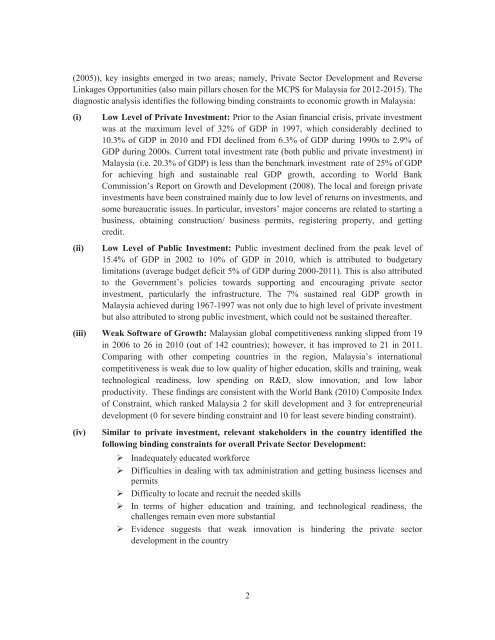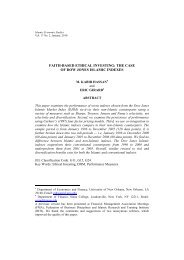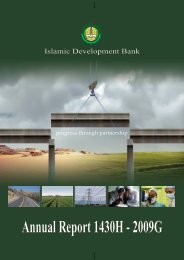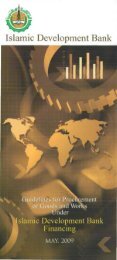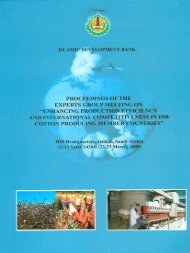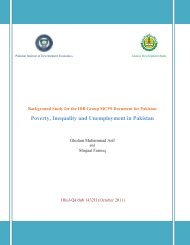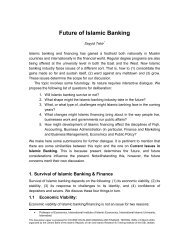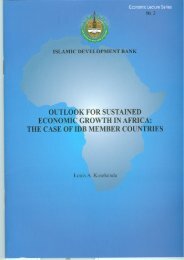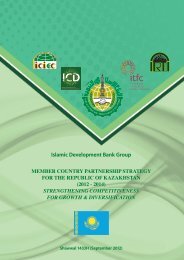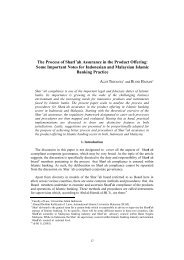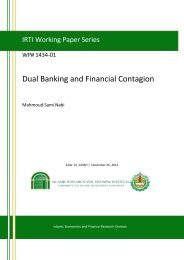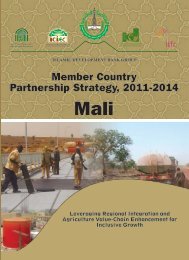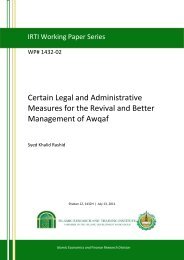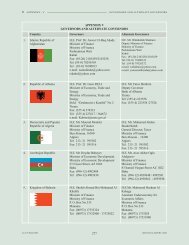Country Economic Work for Malaysia - Islamic Development Bank
Country Economic Work for Malaysia - Islamic Development Bank
Country Economic Work for Malaysia - Islamic Development Bank
Create successful ePaper yourself
Turn your PDF publications into a flip-book with our unique Google optimized e-Paper software.
(2005)), key insights emerged in two areas; namely, Private Sector <strong>Development</strong> and Reverse<br />
Linkages Opportunities (also main pillars chosen <strong>for</strong> the MCPS <strong>for</strong> <strong>Malaysia</strong> <strong>for</strong> 2012-2015). The<br />
diagnostic analysis identifies the following binding constraints to economic growth in <strong>Malaysia</strong>:<br />
(i)<br />
(ii)<br />
Low Level of Private Investment: Prior to the Asian financial crisis, private investment<br />
was at the maximum level of 32% of GDP in 1997, which considerably declined to<br />
10.3% of GDP in 2010 and FDI declined from 6.3% of GDP during 1990s to 2.9% of<br />
GDP during 2000s. Current total investment rate (both public and private investment) in<br />
<strong>Malaysia</strong> (i.e. 20.3% of GDP) is less than the benchmark investment rate of 25% of GDP<br />
<strong>for</strong> achieving high and sustainable real GDP growth, according to World <strong>Bank</strong><br />
Commission’s Report on Growth and <strong>Development</strong> (2008). The local and <strong>for</strong>eign private<br />
investments have been constrained mainly due to low level of returns on investments, and<br />
some bureaucratic issues. In particular, investors’ major concerns are related to starting a<br />
business, obtaining construction/ business permits, registering property, and getting<br />
credit.<br />
Low Level of Public Investment: Public investment declined from the peak level of<br />
15.4% of GDP in 2002 to 10% of GDP in 2010, which is attributed to budgetary<br />
limitations (average budget deficit 5% of GDP during 2000-2011). This is also attributed<br />
to the Government’s policies towards supporting and encouraging private sector<br />
investment, particularly the infrastructure. The 7% sustained real GDP growth in<br />
<strong>Malaysia</strong> achieved during 1967-1997 was not only due to high level of private investment<br />
but also attributed to strong public investment, which could not be sustained thereafter.<br />
(iii) Weak Software of Growth: <strong>Malaysia</strong>n global competitiveness ranking slipped from 19<br />
in 2006 to 26 in 2010 (out of 142 countries); however, it has improved to 21 in 2011.<br />
Comparing with other competing countries in the region, <strong>Malaysia</strong>’s international<br />
competitiveness is weak due to low quality of higher education, skills and training, weak<br />
technological readiness, low spending on R&D, slow innovation, and low labor<br />
productivity. These findings are consistent with the World <strong>Bank</strong> (2010) Composite Index<br />
of Constraint, which ranked <strong>Malaysia</strong> 2 <strong>for</strong> skill development and 3 <strong>for</strong> entrepreneurial<br />
development (0 <strong>for</strong> severe binding constraint and 10 <strong>for</strong> least severe binding constraint).<br />
(iv)<br />
Similar to private investment, relevant stakeholders in the country identified the<br />
following binding constraints <strong>for</strong> overall Private Sector <strong>Development</strong>:<br />
‣ Inadequately educated work<strong>for</strong>ce<br />
‣ Difficulties in dealing with tax administration and getting business licenses and<br />
permits<br />
‣ Difficulty to locate and recruit the needed skills<br />
‣ In terms of higher education and training, and technological readiness, the<br />
challenges remain even more substantial<br />
‣ Evidence suggests that weak innovation is hindering the private sector<br />
development in the country<br />
2


